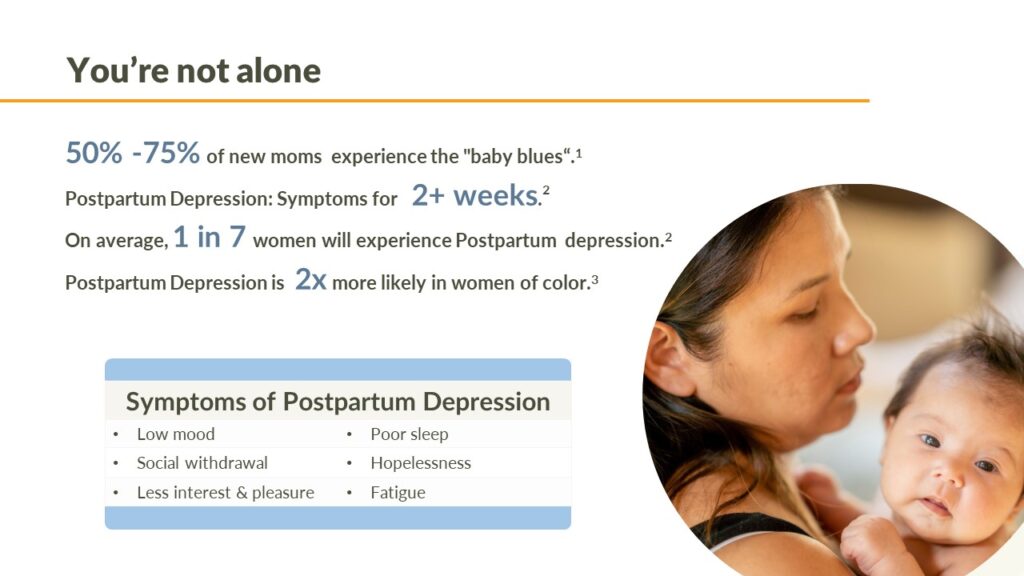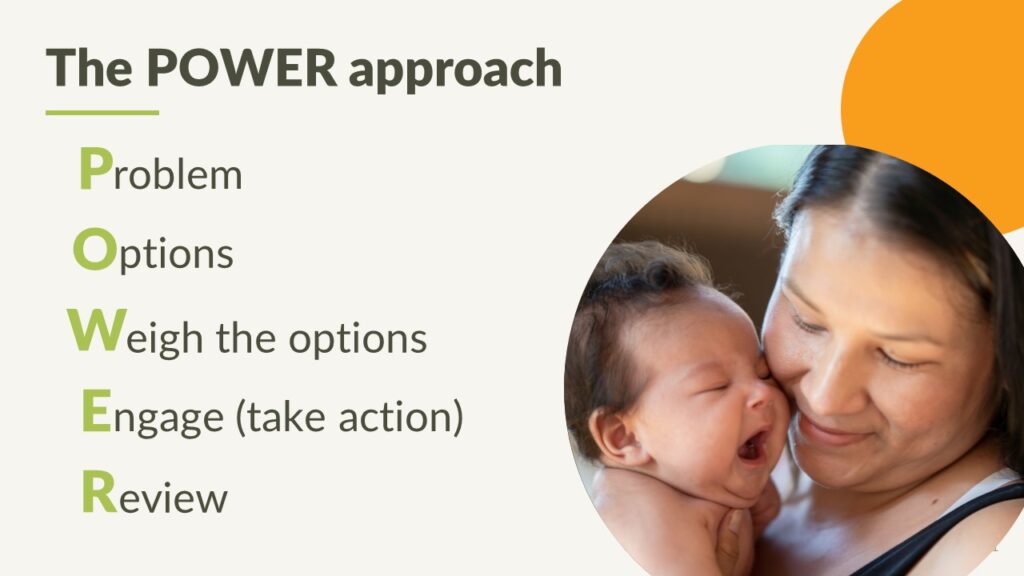Postpartum depression is a common problem that many new moms face after having a baby. It can make them feel sad and tired. Postpartum depression is not something to be ashamed of or feel guilty about. It is a real medical condition that can be treated. With the right support and care, moms can feel better and enjoy being a mom.
Becoming a mom means stepping into a new role. New moms go from “me to we”. There are many challenges that new moms face as they step into this new role. It’s really hard. In fact, 50-75% of new mothers experience the “baby blues“. That refers to all those emotional lows that are so common for new moms.

Those “baby blues” usually disappear on their own in a couple of weeks. The moms who develop clinical postpartum depression experience symptoms beyond two weeks. And for the 1 in 7 women who do experience postpartum depression, the normal challenges of stepping into the “we” role can become even more difficult. They may experience low mood and discouragement, withdrawal, and an ongoing wish to be alone. Things just don’t seem fun anymore. These moms may have difficulty falling or staying asleep, or a wish to sleep all the time. There may be a sense of being without hope and almost constant fatigue. There are some powerful strategies that can help moms who are struggling with these low moods.
The Importance of Activation
One of the main things that happen when we start to feel down and depressed is that we become less activated. When we are managing the new responsibilities of motherhood and dealing with a low mood, that low mood tends to tell us to withdraw rather than to engage with the world. And many of us think that we have to wait until our mood is improved to try to engage. Actually, doing the activity first can improve your mood.
So, what is activation? It means getting out and doing those things that can help us experience rewards. Those rewards can help us bounce back when we have a setback. This might mean getting out and doing things we enjoy. Nudging ourselves to learn new things. Reaching out and helping others. Sometimes getting the little things done creates small “wins”. Next you can try something bigger. Our work can also be an important part of the mix and so can socializing. Our hobbies and doing other things to actively care for ourselves can be an important part of activation as well.
You might be asking yourself – where do I start? If you want to focus on socializing, try calling a friend to go for a walk or to go to a playground. For a hobby, maybe you take 15 minutes to read or dig in your garden. For accomplishments, you might choose to declutter or organize. For fun, you play a board game with your partner.
Try the POWER Approach
This next strategy addresses the problem of simply feeling stuck when we feel down. The POWER approach is a way to tackle problems. Here is the idea: if we slow down, we can build a plan, and then really act on it.

Start by listing the problem and then any options that come to mind that could solve that problem. Any idea is a good idea. That’s the P and the O in POWER. For the W we narrow it down to the top three ideas as we weigh the options. Next make a specific plan to engage in the idea – that is the E. The R is review. Commit to checking in on how it’s going. Make note if the activity is making a difference in your mood.
Take Care of Yourself
It’s important to remember that one of the challenges moms experience is taking care of themselves. It is easy to focus all your energy on the baby. But this is a time when self-care is particularly important.
You can begin by cutting back on social media, which leads to something called upward social comparison. We look at others’ lives and feel like we cannot compare. We begin to think that life is not fair, which contributes to depression. Many studies have shown that cutting back on social media can improve our moods.
It is also a time to nourish your body. But we get so busy that we just eat the leftovers on our kids’ plates or a quick frozen meal. But this is the time to prioritize your own nutrition and eat well-balanced, filling meals. If you can, get help preparing some meals in advance. It is also a time to see if you can get in some form of movement. Just five or 10 minutes of stretching or a quick walk can help.
And don’t forget to prioritize your sleep. Turning off the TV and putting your phone away an hour before bed can make a big difference. If you can, sleep when the baby sleeps. This is important for some moms, especially when the baby is up during the night.
Finally, if you are an introvert, you might want to take a few minutes to be by yourself and curl up with a book. If you are an extrovert, try to connect with friends or family.
Get Started
Pick one or two of these and build them into a habit. Choose something you’re already doing, like sitting down for that morning cup of coffee. Follow this by immediately doing the new habit that you’re trying to build and then reward yourself with something meaningful to you!
References
1) Cleveland Clinic Medical Professionals. (2022, April 12). Postpartum depression: Causes, symptoms & treatment. Cleveland Clinic. Retrieved February 8, 2023, from https://my.clevelandclinic.org/health/diseases/9312-postpartum-depression
2) Mughal S, Azhar Y, Siddiqui W. Postpartum Depression. [Updated 2022 Oct 7]. In: StatPearls [Internet]. Treasure Island (FL): StatPearls Publishing; 2022 Jan-. Available from: https://www.ncbi.nlm.nih.gov/books/NBK519070/ Retrieved February 8th, 2023 from https://www.ncbi.nlm.nih.gov/books/NBK519070/
3) Howell EA, Mora PA, Horowitz CR, Leventhal H. Racial and ethnic differences in factors associated with early postpartum depressive symptoms. Obstet Gynecol. 2005 Jun;105(6):1442-50. doi: 10.1097/01.AOG.0000164050.34126.37. PMID: 15932842; PMCID: PMC4302723. https://pubmed.ncbi.nlm.nih.gov/15932842/




